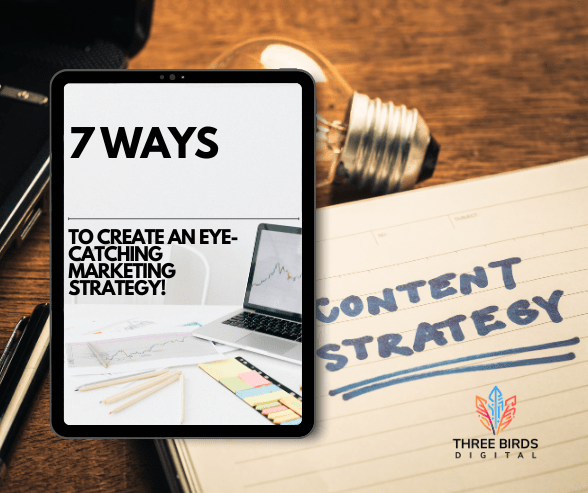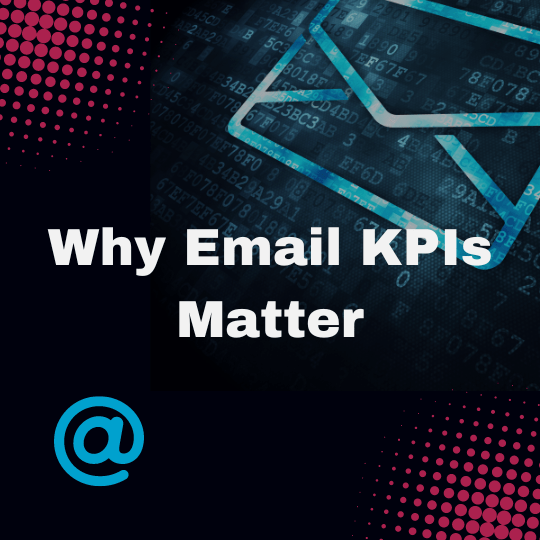
Artificial Intelligence (AI) has become the cornerstone of innovative marketing strategies in an age where digital transformation dictates market trends. Yet, despite its widespread acclaim, there’s a shroud of mystery surrounding its role in marketing. This blog post aims to dispel the fog and demystify AI for marketers and businesses, providing a clear view of its capabilities and limitations.
Understanding Artificial Intelligence in Marketing
AI, in the simplest terms, is a system’s ability to interpret data, learn from it, and use those learnings to achieve specific goals and tasks through flexible adaptation. In marketing, it’s the secret sauce that can transform customer data into actionable insights, automate repetitive tasks, and personalize consumer experiences at scale.
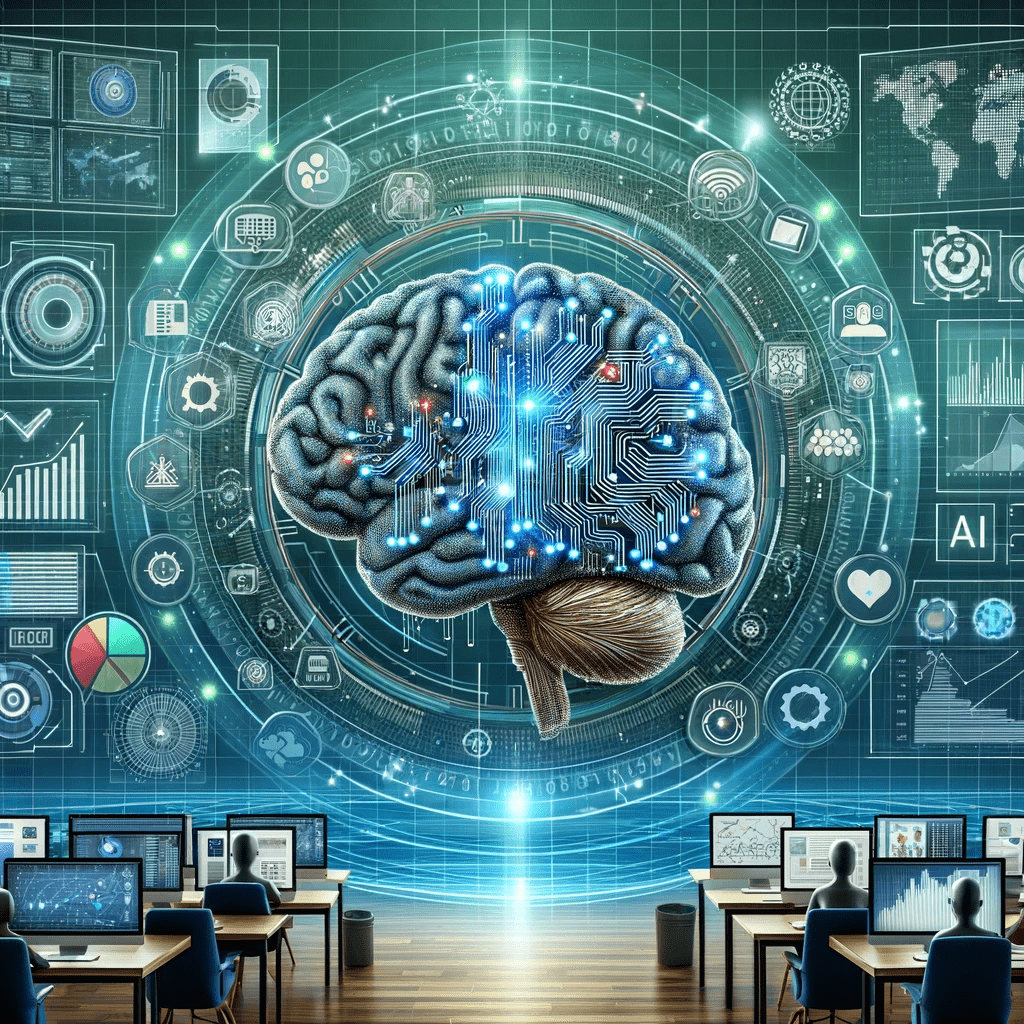
Unlike traditional analytics, which rely on past data to make future predictions, AI examines data in real-time, constantly improving its algorithms through continuous learning. It can anticipate customer behavior, automate responses, and personalize content across various channels, making marketing efforts more efficient and effective.
AI Applications in Marketing
Imagine a world where your marketing tools know your customers as well as you do — perhaps even better. AI makes this possible in various ways:
- Predictive Analytics: Analyzing past consumer behavior can predict future actions, allowing marketers to anticipate needs and tailor their approach.
- Chatbots and Virtual Assistants: AI-powered bots can handle customer service inquiries, provide personalized recommendations, and even facilitate sales, all without a human touch.
- Content Generation: Tools equipped with AI can produce creative content, from email subject lines to social media posts, resonating with the intended audience.
- Programmatic Advertising: AI automates the buying of ads and targets campaigns to the most relevant audience segments, optimizing marketing budgets.
Demystifying Common Artificial Intelligence Myths
The realm of AI is riddled with misconceptions, especially in marketing. Let’s debunk some of these myths to reveal the true picture.
Myth 1: AI Will Replace Human Marketers
The fear that AI will render human marketers obsolete is unfounded. While it excels at processing data and automating tasks, human intuition, creativity, and emotional intelligence are irreplaceable for strategy formulation and understanding the subtleties of consumer behavior.
Myth 2: AI Can Solve All Marketing Problems Instantly
AI is not a magic wand. It requires careful planning, quality data, and ongoing management. AI systems improve over time through machine learning, but they need human guidance to understand the context and nuances of marketing challenges.

Myth 3: AI Is Too Complex for Traditional Marketers to Understand
AI technology has become more user-friendly and accessible. Numerous platforms are tailored to non-technical users, allowing marketers to leverage them without needing to code or have an in-depth understanding of the technology.
Myth 4: AI Is Only for Large Corporations with Big Budgets
The democratization of AI tools has leveled the playing field. Even small and medium-sized enterprises can now deploy solutions to optimize their marketing efforts, thanks to various cost-effective and scalable AI tools available in the market.
Types of Artificial Intelligence Used in Marketing
Marketing departments now have a gamut of AI tools at their disposal. Here’s how they’re being used:
Machine Learning and Predictive Analytics
By analyzing customer data and identifying patterns, machine learning algorithms can forecast future buying behaviors, helping marketers to personalize their approach and enhance customer engagement.
Natural Language Processing (NLP)
NLP is invaluable for parsing customer feedback, automating social media interactions, and even generating content. Its ability to understand and generate human language makes it a powerful tool for engaging with customers on a large scale.
Chatbots and Virtual Assistants
These AI-powered interfaces can communicate with customers in real time, answering queries, providing recommendations, and facilitating purchases, thus enhancing the customer experience and freeing up human resources for more complex tasks.
Programmatic Advertising
AI’s ability to analyze vast amounts of data in real-time revolutionizes how ads are bought and targeted. Programmatic platforms use AI to place ads in front of the right audience at the right time, maximizing the effectiveness of advertising budgets.
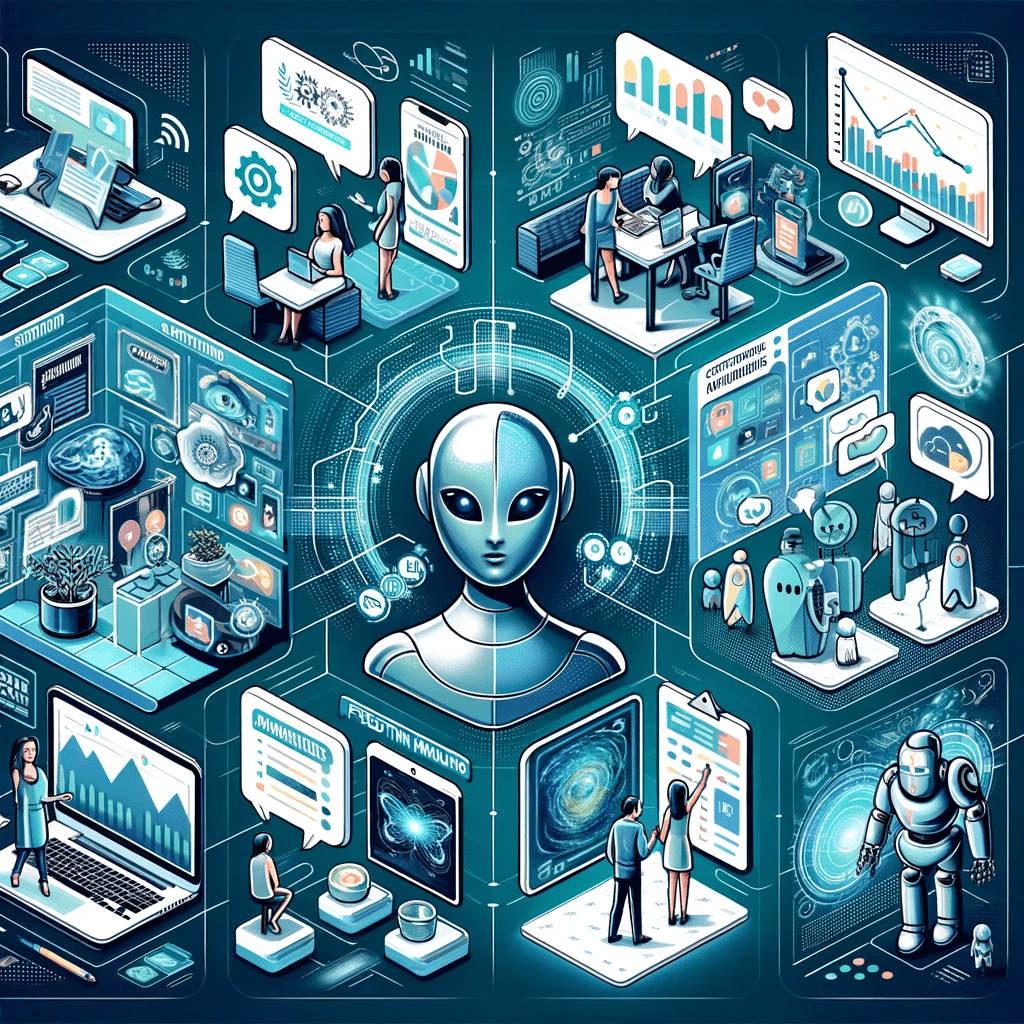
How to Implement AI in Your Marketing Strategy
Implementing AI into a marketing strategy is not about deploying a set of tools; it’s about transforming the approach to data, insights, and customer engagement. Here’s how you can do it effectively:
Assessing Your Needs and Readiness
Before diving into AI, you should thoroughly assess your current marketing processes and identify specific pain points or opportunities where they could have a significant impact. This involves:
- Data Audit: Evaluate the quality and structure of the data you currently collect. AI thrives on large, well-organized datasets.
- Technology Infrastructure: Determine if your current technology infrastructure can support AI integration or if upgrades are necessary.
- Skills Inventory: Assess whether your team has the necessary skills to implement and manage AI solutions or if training or hiring is needed.
Starting Small with Tools and Scaling Up
It’s wise to start with smaller AI projects that can deliver quick wins. For instance:
- Email Personalization: Use AI tools to segment your audience and personalize email content, increasing the relevance and effectiveness of your campaigns.
- Customer Service Chatbots: Implement a chatbot on your website or social media to handle routine customer inquiries, thereby improving response times and freeing up your staff for more complex issues.
As you gain confidence and expertise, you can gradually scale up your initiatives:
- Predictive Customer Behavior Modeling: With more sophisticated AI, you can predict future purchasing patterns and tailor your marketing accordingly.
- Advanced Personalization: Going beyond emails, it can personalize the entire customer journey across all touchpoints, delivering a seamless and customized brand experience.
Integrating AI with Existing Marketing Tools
Integrating AI into your existing marketing tools is not just about adopting new technology; it’s about enriching the customer experience and optimizing your marketing efforts. Here’s how to approach the integration process:
Start with Strategy, Not Technology
Begin by defining clear objectives for what you want AI to achieve in your marketing. Whether improving customer engagement, increasing conversion rates, or personalizing the user experience, your goals will guide the integration process.
Data Infrastructure
AI is only as good as the data it processes. Ensure your data infrastructure is robust and that systems can access the necessary data across platforms. This might mean upgrading your data storage solutions or adopting new data management systems that interact with AI tools.
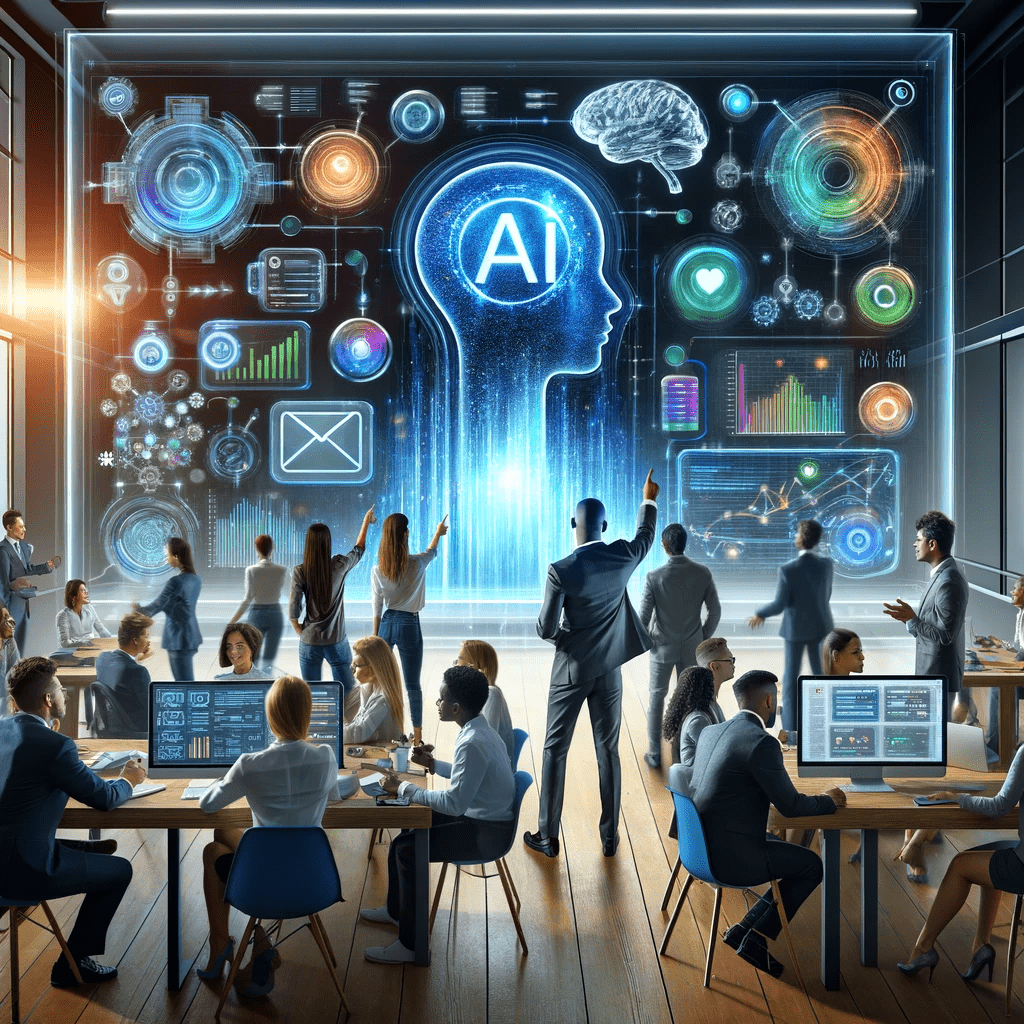
CRM Systems
Customer Relationship Management (CRM) systems are at the heart of many marketing strategies. Integrating AI can enhance these systems by:
- Enhanced Lead Scoring: It can analyze a broader range of behaviors and predict which leads are most likely to convert, helping sales teams prioritize their efforts.
- Sales Forecasting: AI algorithms can process historical sales data to predict future trends and sales, enabling better inventory management and marketing planning.
Content Management Systems (CMS)
Your CMS can benefit from AI in several ways:
- Content Personalization: Track user behavior and dynamically adjust the content it displays to match user preferences, increasing engagement.
- SEO Optimization: AI tools can suggest improvements to content based on search trends, helping you rank higher in search engine results.
Email Marketing Platforms
AI integration with email marketing can significantly boost campaign effectiveness:
- Segmentation: AI can create highly detailed customer segments based on behavior, demographics, and engagement history.
- Send-Time Optimization: AI can predict the best times to send emails to each segment, increasing open rates and click-through rates.
Advertising Platforms
Programmatic advertising platforms are ripe for AI integration:
- Targeting Efficiency: AI algorithms analyze user data to serve ads to those most likely to be interested in your product, reducing ad spend waste.
- Budget Allocation: AI can manage and adjust advertising budgets in real-time to capitalize on the best-performing campaigns.
Social Media Management
AI can revolutionize your social media strategy by:
- Predictive Analytics: Predicting trends and suggesting content that is likely to perform well.
- Automated Responses: Providing timely responses to customer inquiries, even outside of business hours.
E-commerce Platforms
For e-commerce, AI can personalize the shopping experience:
- Product Recommendations: Offering personalized product recommendations based on browsing and purchase history.
- Price Optimization: Dynamically adjusting prices based on demand, competition, and user behavior.
Challenges and Considerations
The integration of AI is not without its challenges. It requires a careful balance of technical expertise, strategic planning, and ongoing management. Privacy and ethical considerations are also paramount, as it will handle large amounts of personal customer data.
Collaboration Is Key
Successful integration is a team effort. It requires collaboration between marketers, IT specialists, data scientists, and potentially AI vendors. Ensuring that all parties are aligned with the marketing objectives and understand the role of AI will help facilitate a smooth integration.
Continuous Learning and Adaptation
Remember that AI integration is not a set-and-forget solution. It requires continuous learning and adaptation. Regularly review the performance of AI-enhanced tools, stay updated with advancements, and be prepared to iterate your strategy to stay at the forefront of digital marketing.
Integrating AI into your marketing tools offers a world of possibilities to enhance your strategy and deliver superior customer experiences. With careful planning, ethical consideration, and the right expertise, your marketing can become more efficient, personalized, and impactful.

Monitoring AI Performance and Making Adjustments
Continuous monitoring is crucial:
- Performance Metrics: Establish clear KPIs for each AI initiative to measure performance against your objectives.
- Feedback Loops: Create mechanisms to gather feedback on AI tools from your team and customers to identify areas for improvement.
- Agility: Be prepared to iterate quickly. If an AI application isn’t meeting expectations, be ready to pivot and try new approaches.
Ensuring Ethical AI Use
Ethics can’t be an afterthought in AI marketing:
- Bias and Fairness: Actively work to identify and mitigate biases in AI algorithms that could lead to unfair treatment of specific customer groups.
- Transparency: Be transparent with customers about how AI is being used, particularly with their data.
- Compliance: Stay abreast of and comply with all relevant data privacy and AI regulations.
To learn more about using AI ethically, click on the link below to put a feather in your cap to get in-depth insights!
Learn The Ins And Outs of AI In Marketing With An Expert
Implementing AI in marketing requires a balanced combination of strategic planning, technological integration, and ethical consideration. By starting small, focusing on integration, and being prepared to learn and adapt, organizations can harness the power of AI to drive marketing innovation and create more meaningful and effective customer interactions.
The journey to integrating AI within your marketing strategy is as promising as it is intricate, and it beckons for a guided approach to unlock its full potential. Whether you’re starting small or ready to scale up sophisticated AI solutions, the pathway to a transformed marketing landscape through AI is within reach.
If you find yourself at the crossroads, seeking clarity or ready to leap into AI-driven marketing, remember that guidance is just an email away. For a deeper dive into AI’s role in revolutionizing marketing and to stay ahead with the latest insights, join the Three Birds Digital newsletter. Don’t navigate the complexities of AI alone—contact Three Birds Digital for tailored advice ongoing support, and to become part of a community that’s shaping the future of marketing with AI.
Let’s embark on this transformative journey together. Subscribe Now for more information and insights.


